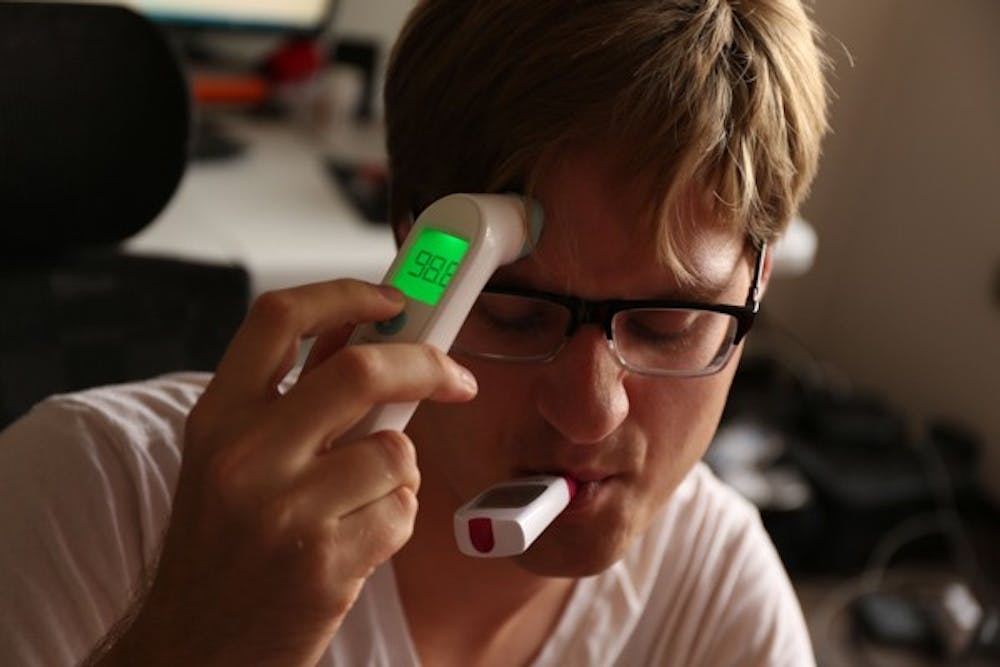 Freelance journalist Marcus DiPaola takes his temperature with two thermometers in West Loop home on Thursday, Oct. 30, 2014. He is being monitored after covering the ebola outbreak in Liberia. (Phil Velasquez/Chicago Tribune/MCT)
Freelance journalist Marcus DiPaola takes his temperature with two thermometers in West Loop home on Thursday, Oct. 30, 2014. He is being monitored after covering the ebola outbreak in Liberia. (Phil Velasquez/Chicago Tribune/MCT)
ASU announced that ASU health officials are following guidelines from the U.S. Center for Disease Control and will be limiting travel to West Africa. They stated this in a letter sent to the ASU community on Oct. 24,
The CDC has cautioned Americans to avoid non-essential travel to Guinea, Sierra Leone and Liberia under a level three high-risk warning due to the Ebola outbreak that is occurring in that area.
Bruce Hooper, ASU's executive director of risk management, said that his department is aiding the Provost's office with response to the situation.
“The policy belongs to the Provost's Office, but we sit on the review committee,” Hooper said.
The committee then determines the University's plan of action, he said.
According to the letter ASU faculty, staff and students may not travel to any West African countries for any university purpose unless they receive approval from the Provost’s office.
Dan Hart, spokesman for the Study Abroad Office, said there are two students currently participating in the CIEE Language and Culture program in Dakar, Senegal, that began on Aug. 24 and will end Dec. 21.
"Both students have been in communication with the ASU Study Abroad Office and both have elected to continue their participation in the program," Hart said.
Hart said they are not going to take risks and are remaining up to date on possible issues the students may face.
"At this time, neither the U.S. government nor the World Health Organization have issued any travel restrictions to Senegal. ASU continues to monitor these resources for up-to-date information about any Ebola risk for our fall 2014 participants," he said.
Although a timeline is uncertain, the University predicts the outbreak could take a minimum of six months to get under control, which could limit travel to West Africa into the spring semester, according to a University Ebola pandemic statement.
The letter also stated that personal travel to this region is strongly discouraged, and any faculty, staff or students must notify ASU Health Services prior to travel and upon return to the University so their health can be monitored.
The letter also pointed out that although the precautions are necessary; the disease is rare outside of West African countries and U.S public health officials are confident in limiting its spread.
In recent months, cases of the disease have been reported to have effected U.S. citizens.
Mayor Greg Stanton made a statement Nov. 3 regarding a man at Phoenix Municipal Court who said he may have been exposed to Ebola by someone outside the U.S.
"Today, Phoenix firefighters and other emergency personnel answered the call quickly and determined the man did not have the virus," he said in a press release.
CNN senior media correspondent Brian Stelter said the national Ebola media attention is disproportionate to the risk it poses on the U.S.
“Covering it nonstop breeds fear, which leads to important government accountability,” Stelter said.
"A few months ago, people were searching for a missing Malaysian plane, now they are searching for Ebola patients, and soon enough it will be something else," he said.
Psychology junior Sean Whitman said Ebola news coverage seems to incite more fear than information.
"I can understand limiting travel and taking precautionary measures," he said. "But it seems like they are trying to cause fear."
However, prior to the full-force media attention, ASU Regents’ Professor Charles Arntzen was named Arizona Bioscience researcher of the year for his role in helping create an experimental drug for the Ebola virus.
Although the risk to the ASU community itself is low, the University remains committed to researching the epidemic with its available resources.
For anyone interested in learning more about Ebola, the University is offering a training course on the ASU Blackboard portal.
Reach the reporter at rtdavis1@asu.edu or follow her on Twitter @ryantaylordavis
LikeThe State Press on Facebook and follow @statepress on Twitter.




